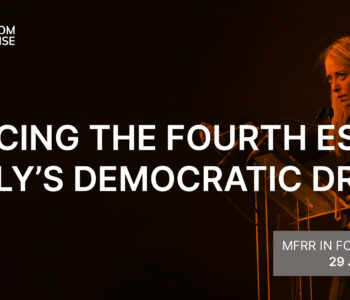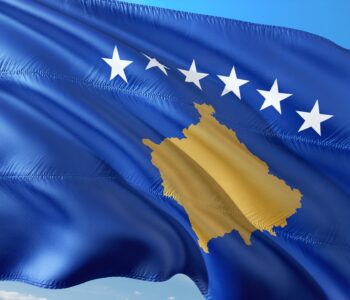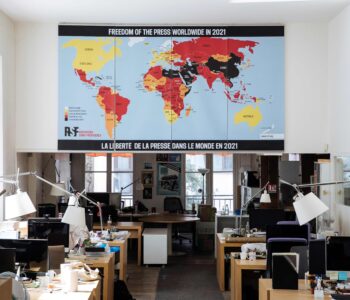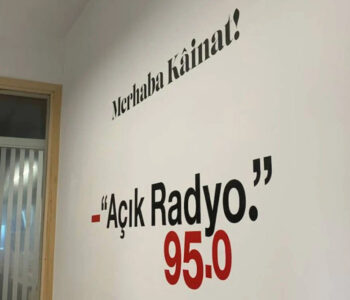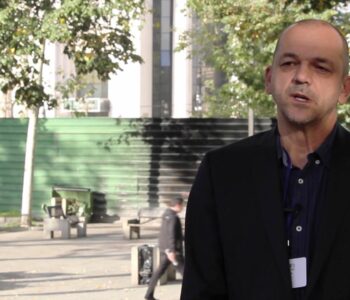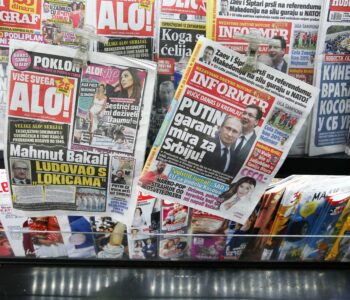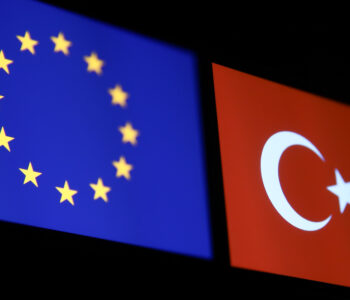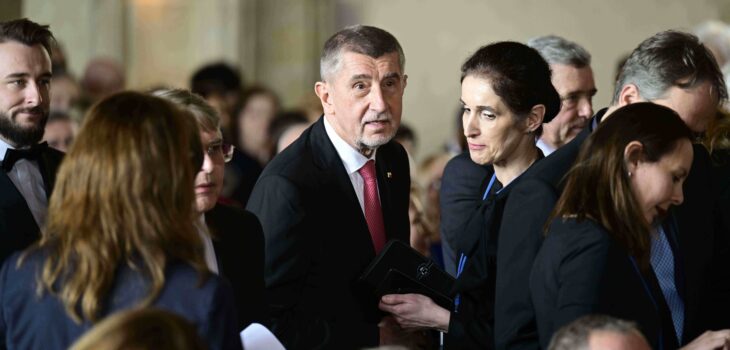
Czech Republic: What Andrej Babiš’s potential sale of Mafra could mean for the media landscape
Reports of negotiations stir speculation about potential buyers for influential publishing group
By IPI contributor Vojtěch Berger
Andrej Babiš, the former Czech prime minister and oligarch, will probably offload his media. Paradoxically, not because he is withdrawing from politics, but so that he can stay in it.
This year it will be ten years since Babiš sent out what is probably his most famous tweet. The simple message set off wild speculation in mid-2013. A number of insiders were presuming the businessman, billionaire oligarch and then fledgling politician was going to acquire Ringier media outlets for his portfolio, including Blesk, the most widely read tabloid in the Czech Republic. In the end, it turned out it was the publishing house Mafra that became part of Babiš’s Agrofert conglomerate.
This controversial acquisition fired the starting gun on a decade of major changes in the Czech media market, as major media houses moved from foreign owners into the hands of Czech oligarchs. After ten years of Babiš‘ ownership Mafra is likely to be sold. The question is to whom and for how much.
From speculations about several potential bidders, the names of two big players in the energy business – Pavel Tykač and Daniel Křetínský – finally crystallized. In the case of Křetínský, the purchase of Mafra would significantly expand his already extensive media empire. In addition to the Czech market, Křetínský owns shares in several French print titles such as Le Monde, Marianne and Elle. He is also interested in investing in podcast platforms in France. Tykač does not own any media and would be a newcomer to the club of “media oligarchs”.
Oligarchization of the Czech media landscape
Babiš bought Mafra in 2013 from the German company Rheinisch-Bergische Verlagsgesellschaft. Over the next few years, other billionaires followed suit and snapped up legacy media as a means of strengthening influence alongside their core businesses.
The Czech portfolio of Swiss Ringier was bought by energy tycoon Daniel Křetínský. Dozens of regional daily newspapers and other magazines were bought from the German group Verlagsgruppe Passau by the financial group Penta. Under this growing media capture, different owners began to interfere in the editorial independence of their media to different degrees. In some, critical or investigative reporting on certain topics quietly became off limits.
As this oligarchization and its implications for media freedom continued, smaller independent projects popped up, often founded by journalists who quit after threats were made to their media’s editorial independence.
Babiš also soon added the commercial radio station Impuls to his media portfolio, followed by about 30 lifestyle magazines acquired from another German publisher, Bauer Media, in 2018. For years, these media were essentially used as promotional platforms for his election campaign.
When Babiš was running for president in January 2023, these magazines published a series of articles showing him as a great father and an ordinary and smiling man. There were also interviews with his wife and glimpses behind the scenes of the Babiš family.
Overall, the texts seemed like PR materials written on demand, but they pretended to be editorial content. The subliminal message to the readers – mainly to the female readers – was obvious: vote for Babiš. Similar texts in support of Babiš were published in the same lifestyle magazines in previous years. Previously, these titles did not focus on politics at all, but that changed when Babiš became their owner.
The Czech press law does not require newspapers and magazines to have a balance of opinion, so such texts are not in breach of the law, but undoubtedly highly problematic in terms of journalistic ethics.
Election defeat
This aggressive campaign and the support of his own media proved insufficient for Babiš in the end, and his failure in the presidential election fueled speculation that he would sell Mafra.
Rumours that the publishing house might change hands appeared last autumn, and the new year brought a new name of a possible buyer. Previously, there was speculation about the aforementioned Daniel Křetínský. But in February, another billionaire with an energy business, Pavel Tykač, confirmed his interest in Mafra and that he had started ongoing negotiations. He told Czech Radio that one of his motivations to purchase the media was “so that it does not fall into some hands that will use it in a way that would not be in the interest of this country”.
Mafra’s economic results have not been impressive in recent years. The daily newspapers led by Mlada fronta Dnes and Lidove noviny are losing money, with operating losses are in the tens of millions, according to the magazine Reporter. However, the company’s lifestyle magazines are economically stable and the internet portals with radio Impuls are profitable. Overall, the Mafra media group has repeatedly made losses over the past three years.
This suggests that interest in the media house is not so much motivated by profit as by the potential influence that Mafra offers its owner. The business of both Pavel Tykač (Sev.en Energy) and Daniel Křetínský (EPH holding) is not based on media, but primarily on coal mining, electricity and heat production and distribution. From there, they can subsidize any losses of their media holdings.
However, it would be a mistake to say that the whole transaction is not about profit at all. The energy business is inherently dependent on good relations with the state and municipalities, and the Czech state has so far generously subsidized the oligarchs with state advertising, which has almost exclusively ended up with the big media houses, like Mafra or Křetínský’s CNC. This fragile symbiosis is likely to continue, despite promises by the government of Petr Fiala to change the state advertising system in order to support smaller independent media. After the government abolished the media and disinformation commissioner in mid-February, the media appears to have fallen off the cabinet’s agenda.
Together, the titles of the Mafra publishing house have a reach of 3.23 million readers, according to last year’s figures, while Daniel Křetínský’s second CNC reaches 3.08 million readers. This shows how much Křetínský would strengthen his market position by buying Mafra.
Tightening controls on media ownership
The question is why Andrej Babiš wants to get rid of this influence and why he wants to do it now. The answer may sound paradoxical: because of politics.
Ten years ago Babiš bought Mafra precisely to strengthen his political clout. But today the ownership of Mafra may make it more difficult for him to remain in politics. After losing the presidential election, Babiš has already announced that he wants to remain a member of parliament.
However, a government amendment to the Conflict of Interest Act that is currently making its way through the legislative process would hit his media business hard.
The new rules, if passed, would ban public officials from owning or publishing media. Crucially, this ban would apply to the ultimate owner of the media company, not just the controlling person or entity. It would include members of the government and serving MPs.
According to the authors of the bill, the amendment will prevent circumvention of the conflict of interest law and should stop efforts by politicians to influence media houses through their ownership, or to make money from public contracts, subsidies or investment incentives. This would be a major issue for Babiš.
According to the register of beneficial owners, the real owner of Agrofert holding, which includes the media house Mafra, is Babiš. So far, it has been enough for him to transfer his assets to trust funds in 2017, thus complying with the current, more lenient law. During this time, however, he has faced criticism that he continues to control his companies.
In his media, this was proven by the positive writings in his magazines and obvious PR for Babiš before this year’s presidential campaign and in previous years. The Mafra daily newspapers were under permanent suspicion of favouring Babiš when they reported less extensively or with different accents on his affairs and conflicts of interest than other media. In other cases, they completely ignored corruption scandals involving Babiš.
It is to be expected that the next owner of Mafra will not abuse these media in such a blatant way, if only because neither Tykač nor Křetínský (if one of them is indeed the buyer) is directly involved in politics.
However, both could undoubtedly use the group’s media influence to benefit their other business. Even after the sale of Mafra, most of the Czech media will remain firmly in the hands of oligarchs.
This article is part of the Media Freedom Rapid Response (MFRR), a Europe-wide mechanism which tracks, monitors and responds to violations of press and media freedom in EU Member States and candidate countries.

